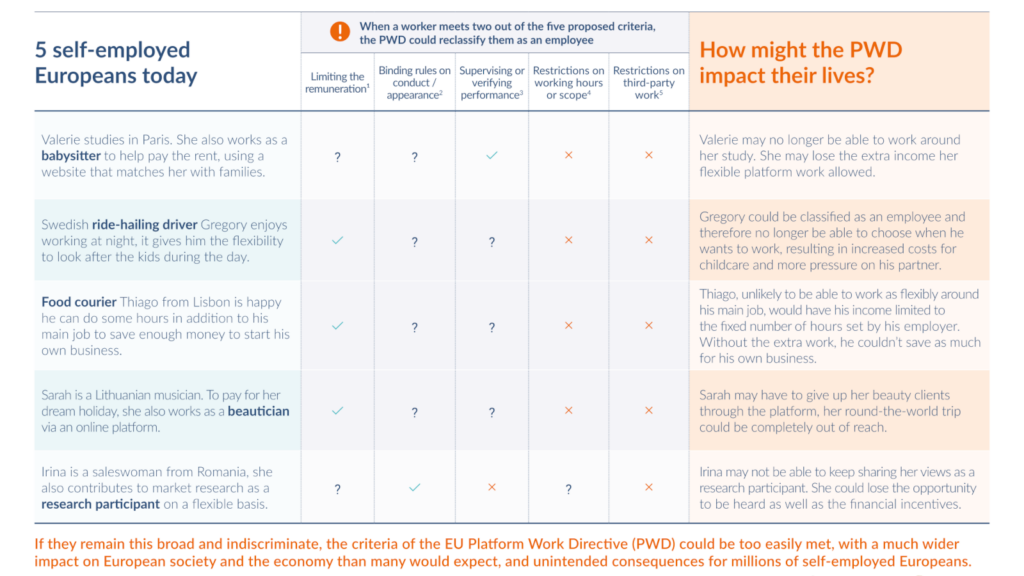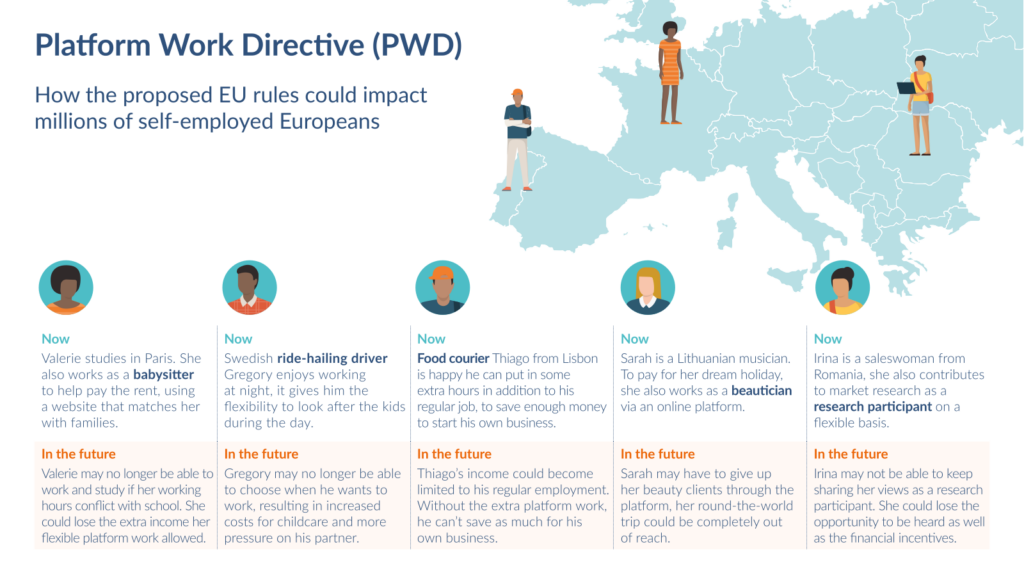Platform Work: How the Proposed EU Rules Could Impact Millions of Self-employed Europeans
Being reclassified as an employee doesn’t necessarily improve working conditions for freelancers. Many important benefits of freelance work could be lost, especially for Europeans who prefer the flexibility and freedom of working as independent contractors. But that’s what is at stake for the up to 28.3 million European workers who might be reclassified as employees as a result of the European Commission proposal on improving working conditions in platform work (per the Commission’s Impact Assessment). While the proposal sounds good in principle, supporting Europe’s modern labour market means protecting freelancers’ flexibility and choice.
The Commission proposal splits the political arena in two. On the one hand, there are politicians who want to force workers (and businesses) into 19th century models of cradle-to-the-grave employment. On the other hand, more progressive politicians want to adapt the work framework to today’s reality: flexibility, accessibility, and freedom are highly valued by millions of self-employed Europeans. In one survey of delivery platform workers, for example, 70% of them put flexibility as the main reason for working as a courier. Luckily, a group of Members of the European Parliament has heard their voices, banding together to urge their policymaking colleagues to reconsider the mass reclassification of platform workers that the Commission proposal might entail.
The key problem is with the criteria used for reclassification. The five criteria that the Commission has proposed to use for reclassifying self-employed workers are problematically broad. This is exacerbated by the fact that meeting just two criteria out of five would force employment reclassification on a freelancer. At the same time, the Parliament’s rapporteur has proposed removing all of the criteria and thereby not requiring that any be met before triggering the presumption. In either case, this amounts to a blunt approach to reclassification. In the absence of limitations on a worker’s freedom and independence, applying a presumption of employment would impact the working conditions of not only the most obvious types of platform workers, i.e. drivers or couriers, but also market researchers, graphic designers, software developers, lawyers, teachers, journalists and more.
As this infographic explains, such an overinclusive and undifferentiated approach means that, under the Commission’s proposal, if any two criteria are met, the individuals would be presumed to be employees. Under the Parliament’s proposal, presumption reclassification would happen even without the criteria being met.
While this would grant access to social protections for the workers, it would also deny them the freedom they currently enjoy. An absence of any criteria is particularly troubling, but even requiring only two criteria to be met may already pose significant issues, given how the first three criteria overlap heavily with standard consumer protections that platforms provide around pricing, conduct, and performance.
A better approach would be to require the meeting of criteria focused on the last two, which strike at the heart of a freelancer’s independence and freedom to work. Policy makers should listen to the voices of platform workers and promote rules that support good quality, flexible, independent work while preserving availability, accessibility, and opportunity. This means allowing platforms to provide insurance and protections in order to improve working conditions and protect users, while also protecting the existing flexibility of a model that is highly valued by workers.
Encouragingly, many EU Member States have already developed forms of social protections for atypical workers. This shows how more progressive approaches to policymaking can improve working conditions without resorting to a forced reclassification of millions of workers that would eliminate the benefits that many enjoy.
Amendments to the Commission proposal that recognise that platforms need to impose protections around pricing, conduct, and performance, in order to protect the consumer experience and thus remain open for freelance workers, should be encouraged. The proposal’s recitals acknowledge this, noting that “digital labour platforms should be able to design their technical interfaces in a way to ensure good consumer experience. Measures or rules which are required by law or which are necessary to safeguard the health and safety of the recipients of the service should not be understood as controlling the performance of work” (draft recital 25). But this acknowledgement still needs to be reflected in the rules for reclassification.
European policymakers should take care to avoid capturing the genuinely self-employed workers when proposing measures to combat bogus self-employment. A more flexible and holistic approach to the five proposed criteria, that considers them in the round and without an automatic presumption, or that focuses primarily on the last two criteria, would be much better suited to separate truly bogus self-employment from modern self-employment. Alternatively, one could consider following the model adopted by the ECJ in the Yodel case to determine whether an individual is self-employed or an employee. This will support Europe’s economic recovery by creating job and growth opportunities, while preserving the flexibility that platform workers value so much.
The new EU rules need to match today’s reality and make sure that workers can benefit from flexible freelance work while avoiding abuse. Building a future-proof and socially responsible labour market that protects the flexibility that modern workers value, will ensure Europe can maintain its competitiveness and enjoy all the benefits of the digital economy long into the future.










